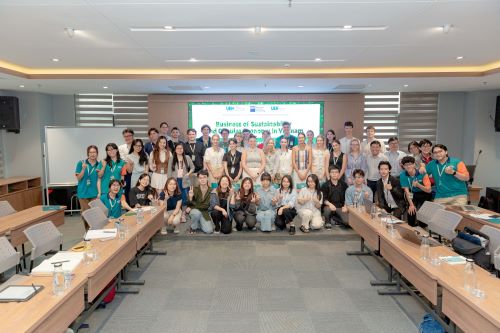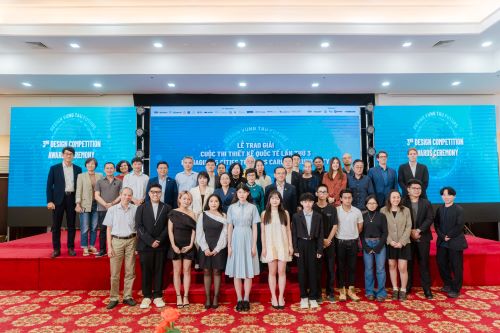
Big Data For Sustainable Development Goal: An International Experience
Agenda 2030 (United Nations) has adopted 17 sustainable development goals (SDGs) including: No poverty (SDG1); Zero hunger (SDG2); Good health and well-being (SDG3); Quality education (SDG4); Gender equality (SDG5); Clean water and sanitation (SDG6); Affordable and clean energy (SDG7); Decent work and economic growth (SDG8); Industry, innovation and infrastructure (SDG9); Reduced inequality (SDG10); Sustainable cities and communities (SDG11); Responsible consumption and production (SDG12); Climate action (SDG13); Life below water SDG(14); Life on land (SDG15); Peace, justice and strong institutions (SDG16); Partnerships for the goals (SDG17). Vietnam is one of the developing countries with a strong commitment to SDG implementation. Vietnam, however, like other countries in the world, is facing difficulties in the lack of SDGs assessment data for many reasons; listing as: huge building cost of SDIs database for collecting environmental data, building a statistical infrastructure capable of measuring and supporting SDG implementation and so on. Therefore, the emergence of Big Data (big data) has been an effective tool to support countries executing SDGs.

Big Data and its role in Sustainable Development Goals (SDGs)
Currently, no unified definition regarding Big data has been introduced although Big data, from our narrowly limited understanding, is an absolutely massive amount of structured and unstructured, traditional and non-traditional data generated every day by mankind (satellite data, climate monitoring sensors, phone call logs, interactive information on the web and so on). Big data, in the broad sense, is not only solely data but also includes analytical and predictive methods and models to ‘understand’ data towards supporting decision making or implementation of a specific problem. Therefore, Big data has 3V characteristics: Extremely large data capacity (Volume) in petabytes or exabytes; Variety of types and content (Variety); Requirements for speed, processing frequency to actual-time level (Velocity). In addition, Big Data must be approached as a new ecosystem characterized by the composition and containment of 3 aspects (3Cs): Crumbs (raw data), Capacities (analytic capabilities, decision support determined by data models, algorithms and computing power) and Communities (party participation to interact with the Big data system).
Regarding Big data, Economist Letouzé initiated a new concept ‘Big data for development’ - referring to reliable data sources suitable for policy formulation and sustainable development program planning, listing as: economic, population and social statistics, geospatial information data for climate monitoring, management and combat of deforestation and forest fires, data generated by social network users and so on.
How is Big Data being deployed in other countries?
In developed countries, Big data applications are helping to solve many problems in bettering healthcare quality, improving logistics efficiency, exploiting sustainable energy, managing smart cities and optimizing growth potentiality of digital economy. The data source for these projects is more and more complex with higher traffic and frequency, requiring more sensors connected to modern IT infrastructure.
Take China as an example, one of the leading countries in the world is applying Big data and Artificial Intelligence in both public and private sectors. Since 2018, Chinese Academy of Sciences (CAS) has launched CAS Big Earth Data Science Engineering (CASEarth) Program, promoting the sharing of data, knowledge, and experiences around the world as well as supporting scientific discovery, technological innovation and policy making, directly supporting the implementation of SDG2, 6, 11, 13, 14 and 15 in China. A CASEarth program study analyzes daily peak temperature data obtained from 754 monitoring stations between 1960 and 2018 to determine the likelihood of reproducibility of heat waves and atmospheric temperature phenomena that are unusually high in China. These study results provide a better understanding of the frequency of heat waves and unusually-high temperatures and indicate that weather extremes occur more frequently in the period after 2000 (on a shorter 5-year cycle; instead of 10-or-20-year as before); moreover, the intensity in Northern region is stronger than that in the South. Accompanying the outstanding development of Chinese economy over the past three decades has been a huge migration wave from the countryside to the city, which has created megacities and significantly reduced the natural water surface area. Therefore, it is an urgent task, regarding CASEarth Program services to support SDG 13 implementation, to forecast the frequency of heat waves and extreme heat events and assess their impacts on economic activities, people’ lives and natural ecosystems more accurately.
Within Digital Single Market strategy framework of EU digital economy version 2.0, BigMedilytics Project is the largest EU-funded initiative to transform healthcare sector of EU region, using modern big data technologies to achieve breakthrough productivity by reducing costs, improving treatment outcomes with better access to medical facilities. BigMedilytics uses health records of more than 11 million patients across 8 EU countries, streaming data from Internet of Things (IoT) connected devices with more than one million records per hour and patient-generated data generated from mobile applications, ensuring that security and privacy of personal data is protected and managed within national framework and EU regulations. This pilot project accomplishes the following goals: Improving treatment outcomes for chronic diseases and cancer using Big data; Optimizing workflow through healthcare service industrialization using Big data; Ensuring Big data concept scalability for healthcare; Enhancing operations through data integration; Establishing secure and private healthcare services across borders and institutions; consequently, underpinning EU Digital Market Strategy, identifying Best Big data applications and allowing knowledge transfer.
In developing countries, Big data projects are deployed, focusing on disaster mitigation and recovery, sustainable development of agroforestry and fisheries, adaptation and forecasting of change impacts by analyzing mobile users’ data, monitoring weather and remote-sensing the Earth.
Take Nepal, the poor country suffering a lot from earthquakes, as an example. In response to natural disasters, Nepal prioritizes the development of practical policies and technologies that enhance disaster preparedness and recovery in order to reduce disaster impacts on poverty and sustainable-development efforts. Technology unit Flowminder has implemented technology that determines the geographical location of phone SIM card when making a call; therefore, creating a map of distribution and characteristics of populations vulnerable to natural disasters in countries with low-and-middle income. On April 25th, 2015, a 7.8-magnitude earthquake occurred in Nepal, killing more than 32,000 people. At the same time, Flowminder, using anonymous mobile user data provided by NCell carrier, was assisting Nepal government, United Nations agencies and humanitarian organizations with actual-time analytics of people's movements. Through this analysis, organizations have effectively planned humanitarian assistance campaigns. Subsequent analysis by Flowminder showed that, after excluding natural emigration, more than half a million Nepalese left the Kathmandu valley (where the earthquake occurred) within two weeks of the disaster.
Big data technology also brings an innovation in how to analyze data regarding residents’ behaviors in actual time. In Indonesia, UN Global Pulse Lab Research Unit exploits social media data, more specifically compared to Twitter users’ tweet data, with the purpose of revealing information related to discrimination at workplace (SDG 5) which is considered to be much more efficient than the traditional survey-based method.

Big data technology brings an innovation in sharp analysis of residents’ behavior data in actual time
Even during Covid-19 pandemic, Big data has provided an opportunity to conduct researches on modeling virus activity, effectively supporting the planning of public health surveillance and policies in response to infection outbreak in many countries around the world. Similarly, in Vietnam, mobile phone users’ data has been used to support in tracing close contact very effectively; however, not a single Big data technology solution applied community health has been fully developed yet.
05 policy suggestions to contribute to national strategy on sustainable development and Big data application to serve sustainable-development goal
The supporting role of Big data application for Sustainable Development Goals of 2030 Agenda has been confirmed by United Nations through researches and practical application trials in many different countries in almost a decade from 2015. Vietnam is one of the developing countries with a strong commitment to the implementation of the SDGs; therefore, many benefits regarding Big data application for tracking and monitoring 115-goal implementation are potential; especially for important sectors: health, education, transport infrastructure, clean water and energy. Based on the analysis and research results of Big data application projects of countries around the world, the authors of University of Economics Ho Chi Minh City (UEH) propose 05 policy suggestions to contribute to national strategy on sustainable development and Big data application for sustainable development goals as follows:
Firstly, to build and to maintain an effective national portal on official statistical data, implementation progress and results of sustainable development goals.
Secondly, to develop and to publish free access to a number of high-quality big data sources in key areas (priority is to be given to the implementation of weather-monitoring data sources and remote-sensing satellites first).
Thirdly, to invest synchronously, to connect Big data technology infrastructure and to encourage the investment participation of the private sector.
Fourthly, to promote scientific research and application of Big data for sustainable development.
Fifthly, to strengthen the legal corridor on data privacy protection, to improve accountability to encourage the active participation of people and businesses in Big data projects in health sector, education and urban management and so on.
Big data has been deployed in developing countries as well as developed countries with the purpose of realizing the goal of sustainable development. Please find out the full aspects and experiences of applying Big data in countries around the world in “Big data for sustainable development: an International experience” Paper here (Author: Dr. Phạm Thái Bình – UEH Institute for Sustainable Finance).
This article is in Article Series of spreading research and applied knowledge from UEH. We cordially invite readers to watch Knowledge Newsletter ECONOMY # 9 “ONLINE RETAIL BUSINESS TRENDS IN COVID-19 PANDEMIC”.
News, photos: Dr. Phạm Thái Bình, UEH Department of Marketing – Communication.






